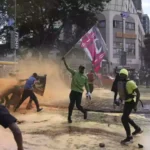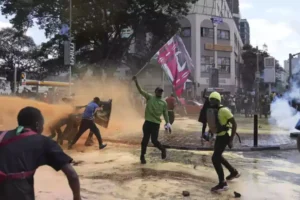Increasing anger over growing inequality, political instability and the rising cost of living is fueling a higher risk of strikes and riots in South Africa, reports international insurance firm Allianz Global Corporate & Speciality (AGCS).
A recent report from the firm found that businesses at large need to be vigilant of a heightened risk of civil commotion, as it can often lead to material damage to property or significant disruptions to operations.
According to Etienne Cheret, Regional Practice Group Leader at AGCS, countries with a high level of polarized politics, such as South Africa, are perceived by many to carry a higher risk of unrest.
“Where protests are particularly disruptive, there is also the danger of counter-movements in retaliation, which can escalate conflict,” he said.
“Specific incidences of civil unrest can be difficult to predict because they often start with a specific trigger such as a change in government, a piece of new legislation or a sudden price rise.”
For South Africa, AGCS said that the outcome of the corruption trial of former president Jacob Zuma could be a flashpoint, as it had been for the July 2021 riots, which cost the country in excess of $1.9 billion (R34.9 billion).
According to the report, South Africa is also at risk of suffering through economic protests, having experienced thousands of these protests in 2022.
In a more global context, over 50% of all countries between the second and third quarters of last year saw a rise in civil unrest risks, said Alliance.
According to recent data, out of 198 countries, 101 experienced a rise in risk, while 42 saw a decrease in risk. This trend of growing instability has been ongoing since the Global Financial Crisis 15 years ago.
Allianz said the most significant deterioration in all indicators had been the occurrence of violent demonstrations, which has increased by almost 50% since 2008.
The insurer highlighted the five main factors they expect to power further unrest in 2023 and beyond, including:
- The ongoing cost of living crisis;
- Distrust of government and institutions;
- Increasing polarization;
- A rise in activism;
- Climate and environmental concerns.
Domestically, political scandals and infighting are ever spread. Last year, President Cyril Ramaphosa faced public backlash over failing to correctly report the alleged theft of millions of dollars stashed in a couch on his Phala Phala game farm.
Disastifcation with key state institutions is also at an all-time high. Rolling blackouts continue to stall business and disrupt day-to-day lives across the country as the national power utility Eskom fails to supply a steady stream of electricity.
Recent allegations have also emerged from the former CEO Andre de Ruyter that the company is essentially led by a mafia, making money off keeping it downtrodden with the – allegedly with the help of high-ranking officials in the ruling party.
On top of that, South Africans are struggling to make ends meet, with inflation hitting record highs this year and interest rates showing no sign of slowing down until they get back within the South African Reserve Bank (SARB) target of between 3%-6%.
Fuel prices, for example, are set to increase once again this week as the rand depreciated against the dollar and the international product prices for petrol increased.
This is not the first warning of further unrest in South Africa. The CEO of Business Leadership South Africa (BLSA), Busi Mavuso, said the country is in deep trouble.
The CEO cautioned that South Africa would encounter demonstrations similar to those that led to the overthrow of governments in Tunisia and Egypt in 2011 unless it addresses its damaged infrastructure, reduces lawlessness, and creates a conducive atmosphere for investment and employment.
Mavuso warned that if the situation continues to deteriorate, it could lead to Arab Spring-like protests, which would further damage the country’s social fabric.
The Franchise Association of South Africa warned in January that tensions in the retail sector are high, with sporadic incidents of rioting and looting already taking place that are threatening to escalate nationally.
[Image: shutterstock/bigreddesignagency]
Source : Business Tech
















